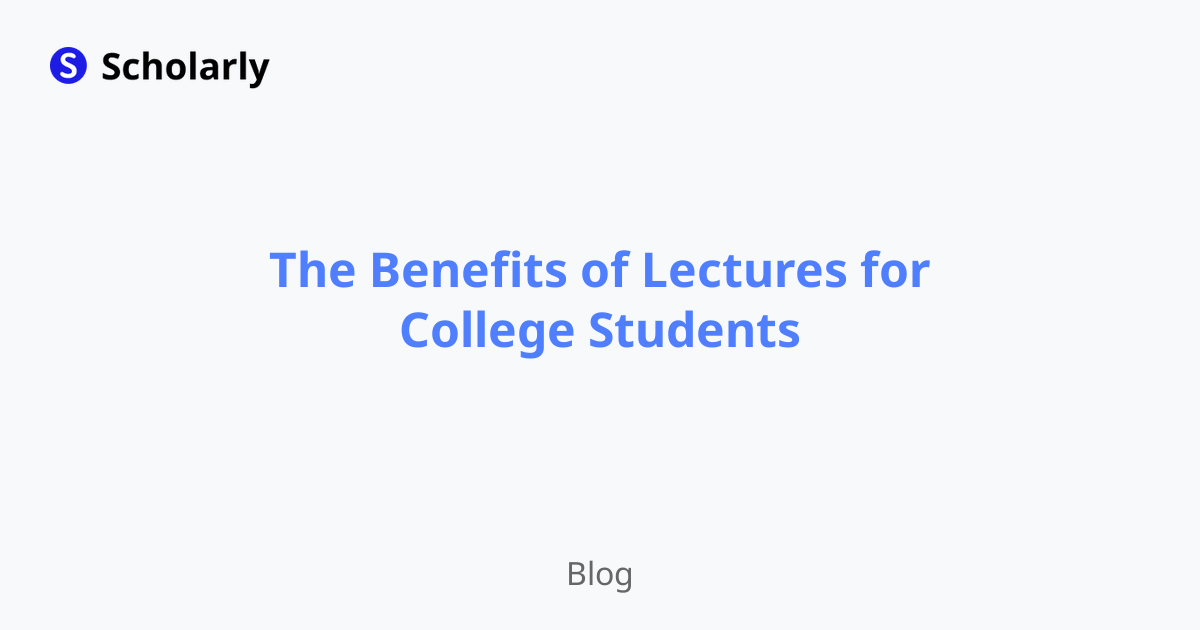The Benefits of Lectures for College Students
Explore the advantages of attending lectures in college and how they contribute to student success. Learn about the history, benefits, best practices, and challenges of lectures for college students.

Introduction
Lectures are a fundamental aspect of the college learning experience. They offer students the opportunity to engage with course material, interact with professors, and learn from their peers. In this article, we will explore the benefits of attending lectures in college and how they contribute to student success. We will also discuss the history of lectures, best practices for getting the most out of lectures, and the challenges associated with this method of teaching.
History of Lectures
In the past, lectures have been the primary mode of instruction in higher education. They date back to ancient times when scholars would gather to share knowledge and engage in intellectual discourse. Lectures have evolved over the years, incorporating various teaching techniques and technologies to enhance the learning experience.
Benefits of Attending Lectures
Enhanced Understanding: Attending lectures allows students to receive information directly from the professors who have expertise in the subject matter. It provides an opportunity for students to ask questions, seek clarification, and gain a deeper understanding of the topics.
Active Learning: Lectures engage students in active learning by encouraging them to take notes, participate in discussions, and ask questions. This active engagement helps students process and retain the information better.
Time Management: Attending lectures helps students develop good time management skills as they are required to adhere to a structured timetable. It keeps students accountable and establishes a routine that promotes effective studying habits.
Social Interaction: Lectures provide a platform for students to connect with their peers, exchange ideas, and engage in collaborative learning. It fosters a sense of community and creates opportunities for networking and forming study groups.
Access to Expertise: By attending lectures, students have direct access to subject matter experts and renowned professors. This exposure to expertise enriches the learning experience and enhances the quality of education received.
Best Practices for Getting the Most Out of Lectures
To maximize the benefits of attending lectures, college students can follow these best practices:
Come Prepared: Review the assigned readings and familiarize yourself with the lecture topic before attending the class. This will help you actively participate and ask relevant questions.
Actively Engage: Take notes, ask questions, and participate in class discussions. Engaging actively during lectures helps you better understand the material and retain information.
Review and Reflect: After the lecture, take time to review your notes and reflect on the content covered. This will reinforce your understanding and help you identify any areas that require further clarification.
Collaborate and Discuss: Form study groups or find a study partner to discuss the lecture material. This collaborative approach allows you to gain different perspectives, clarify doubts, and reinforce your learning.
Seek Additional Resources: Use the lecture as a starting point and explore additional resources such as textbooks, articles, or online materials to deepen your understanding.
Challenges of Lectures
While lectures offer numerous benefits, there are also some challenges associated with this method of teaching:
Passive Learning: Lectures can sometimes result in passive learning, where students simply listen and take notes without actively engaging with the material. This can hinder deep understanding and retention of the information.
Information Overload: Lectures often present a large amount of information in a limited time. Students may struggle to absorb and process all the information, leading to information overload.
Limited Interactivity: Due to the large class sizes in college lectures, it can be challenging for students to ask questions or engage in meaningful discussions. This limits the level of interactivity and personalized attention.
One-size-fits-all Approach: Lectures are designed to cater to a diverse group of students with varying learning styles and preferences. However, they may not effectively meet the specific needs of individual learners.
Accessibility: Students with hearing impairments or learning disabilities may face challenges in fully accessing and comprehending lecture content. Special accommodations may be required to ensure inclusivity and equal learning opportunities.
Conclusion
Lectures play a crucial role in the college learning experience, offering numerous benefits such as enhanced understanding, active learning, time management skills, social interaction, and access to expertise. To make the most of lectures, it is important for students to come prepared, actively engage, review and reflect, collaborate and discuss, and seek additional resources. While lectures have their challenges, with proper strategies and support, they can be an effective tool for student learning and success.
Try Our Popular AI Study Tools
Transform your study materials into interactive learning experiences with our most popular AI-powered tools:
PDF to Flashcards
Convert lecture notes and textbooks into study flashcards instantly
Text to Flashcards
Turn any text or notes into comprehensive flashcard sets
Image to Flashcards
Convert diagrams and handwritten notes into digital flashcards
YouTube to Flashcards
Generate flashcards from educational video content



